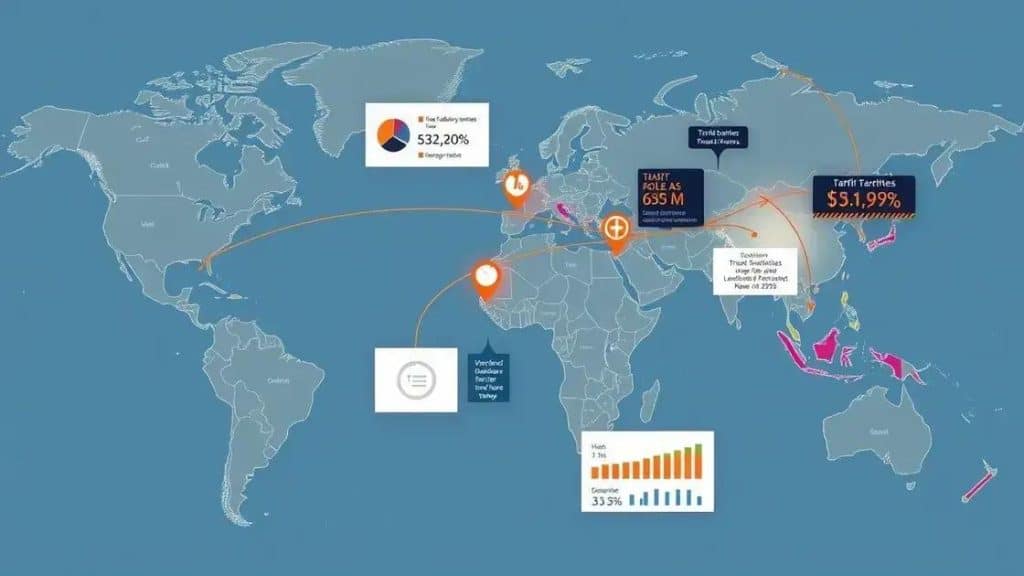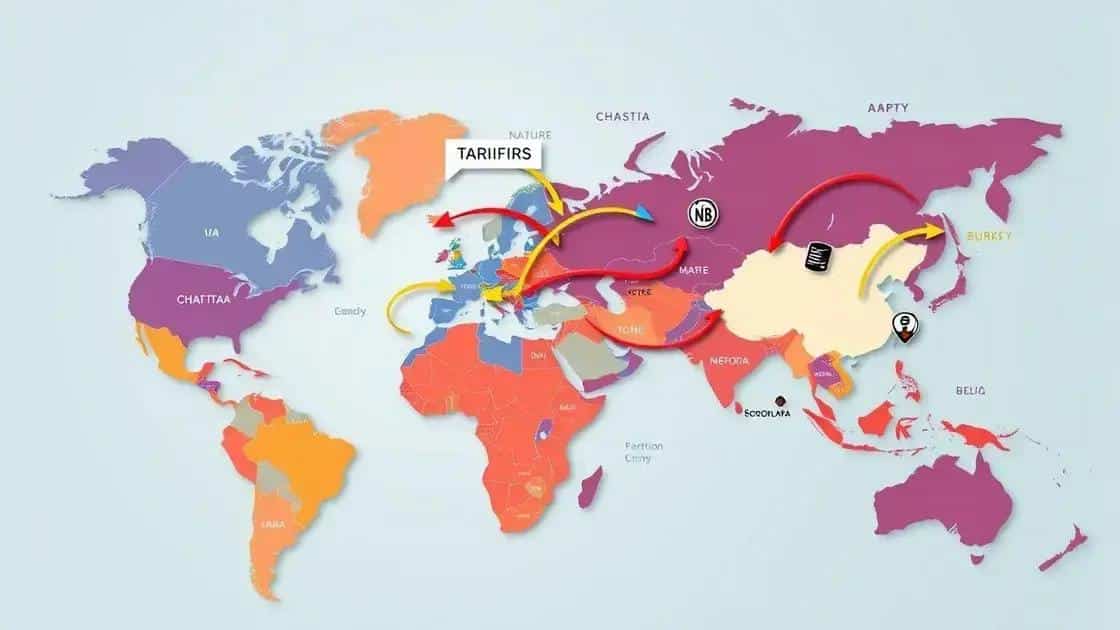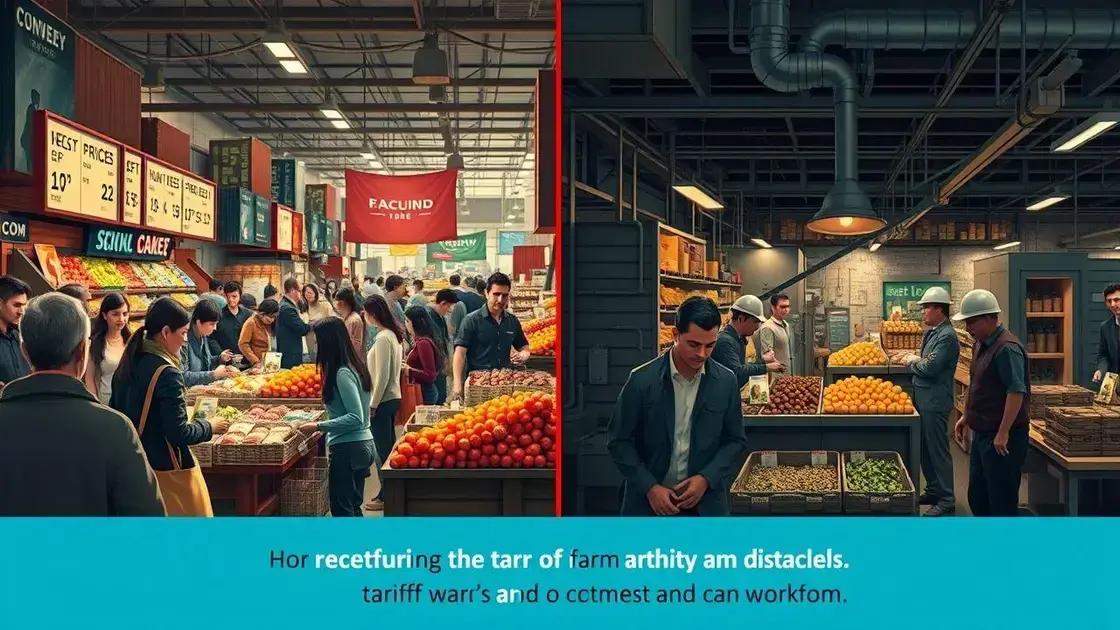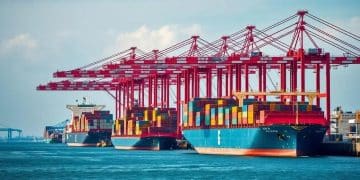Global economic impact of tariff wars: what to know

Anúncios
The global economic impact of tariff wars leads to higher prices for consumers, disrupts trade flows, and creates uncertainties for producers, ultimately affecting the stability of the international market.
The global economic impact of tariff wars is profound, affecting countries and industries worldwide. Have you ever wondered how these conflicts shape everyday trade and prices? Let’s delve into this complex issue.
Anúncios
Understanding tariff wars and their triggers
Understanding tariff wars requires a look into their underlying causes. Tariff wars can emerge from various economic and political factors. They have a significant impact on international trade, affecting consumers and businesses alike.
Key triggers of tariff wars
A few main factors often lead to the initiation of tariff wars. These include:
Anúncios
- Trade imbalances: Countries may feel the need to impose tariffs to correct perceived unfair advantages.
- Political tensions: Diplomatic relations can influence trade policies and lead to increased tariffs.
- Protection of domestic industries: Governments may aim to protect local jobs and industries from foreign competition using tariffs.
These triggers can cause escalations in trade disputes, leading countries to retaliate with their own tariffs. Additionally, the economic climate can greatly influence these actions. For instance, during economic downturns, governments may resort to tariffs as a way to shield their economies. This approach often complicates relationships between nations.
Economic motivations
The motivations for implementing tariffs can vary. For one, they can be a tool to promote local production. When tariffs are imposed, foreign products may become more expensive, encouraging consumers to buy domestically. However, this doesn’t always lead to positive outcomes. Tariffs can raise costs for consumers and disrupt supply chains.
Furthermore, unexpectedly high tariffs can lead to trade retaliation. Countries affected may retaliate, creating a cycle that can escalate into a trade war. It’s important to recognize that the interconnected nature of the global economy means that actions taken by one country can have far-reaching effects.
Key countries involved and their strategies

Several countries play vital roles in tariff wars, each adopting unique strategies that can impact global trade. Understanding the dynamics between these nations is essential to grasping the broader implications of tariff policies.
Major players in tariff wars
Countries like the United States, China, and the European Union are often at the forefront of tariff discussions. Their strategies vary based on a mix of economic goals and political pressures.
- United States: The U.S. often imposes tariffs to protect domestic industries. This approach signals a commitment to American jobs but can create tensions with trading partners.
- China: China has responded to tariffs with its own measures, aiming to support its economy and maintain exports. This strategy can lead to retaliatory actions.
- European Union: The EU typically promotes collective responses to tariffs from other nations, fostering unity among member states while negotiating trade deals.
The strategies used by these players can shift depending on the political climate and economic conditions. For example, during economic downturns, countries may adopt more aggressive tariffs to safeguard their local industries. Retaliatory measures can escalate quickly, creating a cycle of conflict that affects global markets.
Strategic approaches to tariff implementation
Countries often employ various tactics to implement tariffs effectively. These strategies can include:
- Negotiation: Countries may leverage negotiations to avoid escalating tariff conflicts.
- Targeting key sectors: By focusing on significant industries, nations aim to maximize the impact of their tariffs on their trading partners.
- Building coalitions: Governments often collaborate with allies to fortify their positions in trade discussions.
Such strategies illustrate the complex interplay of economics and politics that define tariff wars. The global economy is interconnected, and the decisions made by these key players resonate beyond their borders, impacting businesses and consumers worldwide.
Economic consequences for global trade
The economic consequences of tariff wars can significantly reshape global trade dynamics. Tariffs can create ripple effects that extend beyond borders, affecting numerous industries and consumers worldwide.
Impact on trade flows
When countries impose tariffs, the immediate effect is a change in trade flows. For example, import prices can rise, prompting consumers to shift their preferences towards domestic products. This shift can lead to reduced demand for foreign goods, impacting exporters.
- Changes in pricing: Tariffs typically raise costs for imported goods, leading to higher prices for consumers.
- Supply chain disruptions: Trade barriers can disrupt established supply chains, which may force companies to seek alternative suppliers.
- Market uncertainty: Businesses may hesitate to invest or expand in uncertain environments caused by tariff fluctuations.
Moreover, countries on the receiving end of tariffs may retaliate, resulting in a complex web of trade restrictions. This escalation can lead to broader trade conflicts, affecting businesses of all sizes.
Consumers and businesses affected
The economic consequences reach far and wide. Consumers face higher prices as tariffs increase the cost of imported goods. In contrast, businesses may experience a decline in sales if they rely on foreign suppliers or markets. This situation can be especially difficult for small to medium-sized enterprises that lack the resources to absorb additional costs.
Ultimately, the long-term implications of these tariffs can hinder economic growth. As markets contract and uncertainty grows, investment can slow, leading to job losses in various sectors. Understanding the economic consequences of tariff wars is crucial for navigating this complex landscape.
Long-term effects on consumers and producers

The long-term effects of tariff wars can be profound for both consumers and producers. Over time, these effects can shape market behaviors and economic landscapes.
Impact on consumers
For consumers, prolonged tariff implementations often lead to higher prices on imported goods. This price increase can limit choices and force families to adjust their spending habits. When basic goods become more expensive, consumers may prioritize essential items over luxuries.
- Decreased purchasing power: As prices rise, the money consumers have does not stretch as far, reducing their overall purchasing power.
- Less product variety: Restrictions on imports can lead to a decrease in available products, limiting consumer options.
- Shifts in buying habits: Consumers may begin to favor domestic products, even if they are more expensive, hoping to support local industries.
These changes can create a feedback loop, where continued high prices result in decreased demand, affecting overall market stability.
Impact on producers
Producers also face significant challenges due to tariff wars. While some may benefit from reduced foreign competition, many others may struggle with increased costs for raw materials and retaliatory tariffs from other countries.
- Increased production costs: Tariffs on imported raw materials can raise the cost of production, squeezing profit margins.
- Market access issues: Retaliatory tariffs can limit access to key markets, making it harder for producers to sell their goods abroad.
- Job instability: As companies adjust to new market conditions, layoffs and hiring freezes may become common.
Ultimately, the long-term effects of tariff wars can result in a fundamental shift in the global economy, affecting how consumers buy and how producers operate. Understanding these impacts is crucial for navigating future economic challenges.
FAQ – Frequently Asked Questions about the Global Economic Impact of Tariff Wars
What are tariff wars?
Tariff wars occur when countries impose tariffs on each other’s goods to protect their domestic industries and correct trade imbalances.
How do tariff wars affect consumers?
Tariff wars can lead to higher prices for imported goods, which may reduce consumers’ purchasing power and limit their choices.
What impact do tariff wars have on producers?
Producers may face increased production costs due to tariffs on raw materials and may encounter difficulties in accessing key markets.
Can tariff wars affect the global economy?
Yes, tariff wars can create uncertainty in the global market, potentially leading to slower economic growth and instability.





